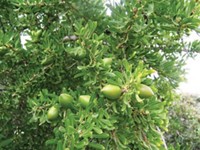Advertisement
Grab your lab coat. Let's get started
Welcome!
Welcome!
Create an account below to get 6 C&EN articles per month, receive newsletters and more - all free.
It seems this is your first time logging in online. Please enter the following information to continue.
As an ACS member you automatically get access to this site. All we need is few more details to create your reading experience.
Not you? Sign in with a different account.
Not you? Sign in with a different account.
ERROR 1
ERROR 1
ERROR 2
ERROR 2
ERROR 2
ERROR 2
ERROR 2
Password and Confirm password must match.
If you have an ACS member number, please enter it here so we can link this account to your membership. (optional)
ERROR 2
ACS values your privacy. By submitting your information, you are gaining access to C&EN and subscribing to our weekly newsletter. We use the information you provide to make your reading experience better, and we will never sell your data to third party members.
Business
Ashland Dives Into Specialties
Acquisitions: Purchase of ISP will sharpen focus on personal care, drug ingredients
by Melody M. Bomgardner
June 3, 2011
| A version of this story appeared in
Volume 89, Issue 23

Ashland has agreed to buy specialty chemical maker International Specialty Products (ISP) for $3.2 billion in cash. The acquisition will expand Ashland’s portfolio of products for the personal care and pharmaceutical markets, which it has targeted for their high margins, high growth rates, and relative immunity to economic downturns.
ISP had $1.6 billion in sales for the 12 months ending on March 31 and earnings before interest, taxes, depreciation, and amortization of $360 million. Ashland’s sales during the same period were $6.0 billion. ISP has 2,700 employees and 17 manufacturing facilities around the world. It’s owned by the family of the late chairman, Samuel J. Heyman, who died in November 2009 (C&EN, March 29, 2010, page 14).
In recent years, Ashland has moved away from legacy businesses such as petroleum refining and chemical distribution and toward specialty chemicals. In 2008, Ashland bought Hercules, another specialty chemical maker, for $3.3 billion. That deal brought with it a major water treatment business and a host of specialty additives and functional ingredients.
ISP has its own history with Hercules. In 2003, Heyman, who was fond of aggressive takeover attempts, failed in a bid to acquire the company. Ashland now plans to place all of ISP into its Aqualon functional ingredients business, which was originally part of Hercules.
About one-third of Aqualon’s current sales are in the personal care, pharmaceutical, and food and beverage markets. ISP will add to those sales and contribute water-soluble polymers and additives for energy, coatings, adhesives, and water treatment applications. The ISP businesses boast operating profit margins of 21%, compared with a 10% average for all of Ashland.
Ashland CEO James J. O’Brien tells C&EN that ISP fulfills his goal of getting Ashland more involved in drug and personal care ingredients. “We had small but important businesses. But by bringing in ISP, it dramatically changes the positions we have. It is 75% more in some areas,” he says.
As a result of the acquisition of ISP, Ashland will get 74% of its revenues from specialty chemicals, compared with 14% in 2004, before the company’s transformation. Valvoline, Ashland’s consumer-branded motor oil company, supplies the balance of the sales.
O’Brien states that he won’t sell Valvoline, and he isn’t identifying any ISP businesses that he would divest.
Because Ashland will finance the purchase mostly with bank debt, it may see its credit downgraded. Still, Moody’s senior analyst James Wilkins says ISP is a good investment. “Many of ISP’s products are tailored to niche product applications subject to limited competition and high barriers to entry,” he told clients.



Join the conversation
Contact the reporter
Submit a Letter to the Editor for publication
Engage with us on Twitter